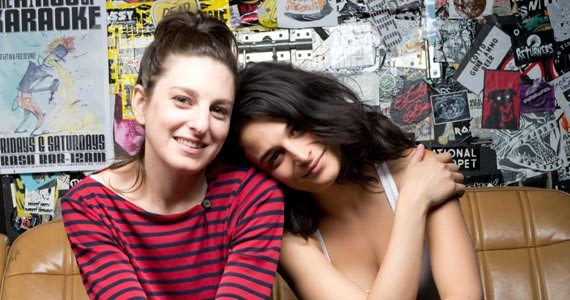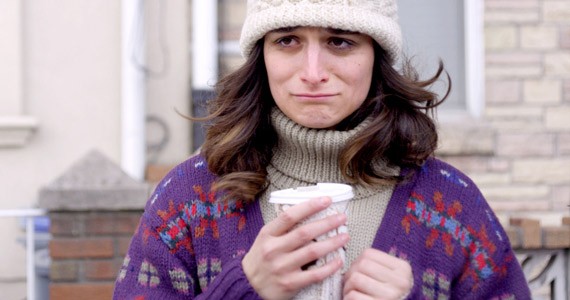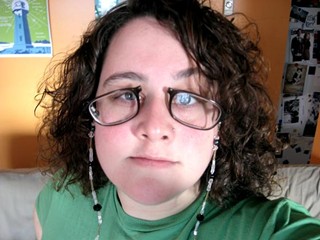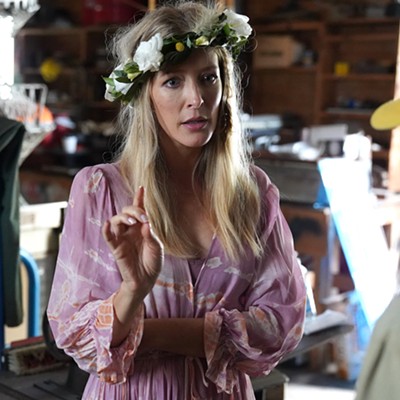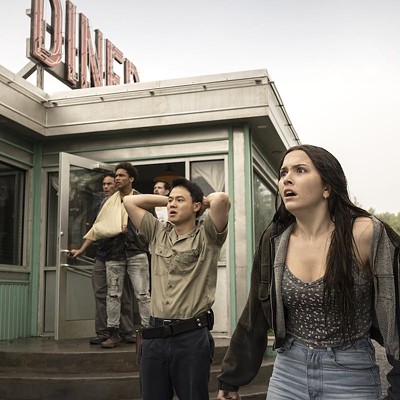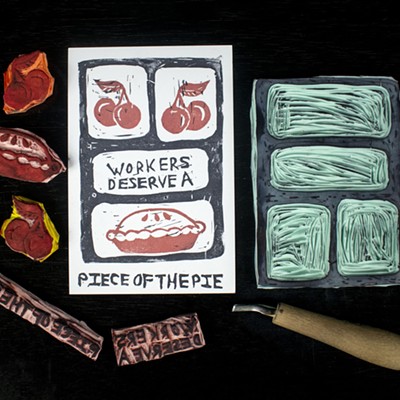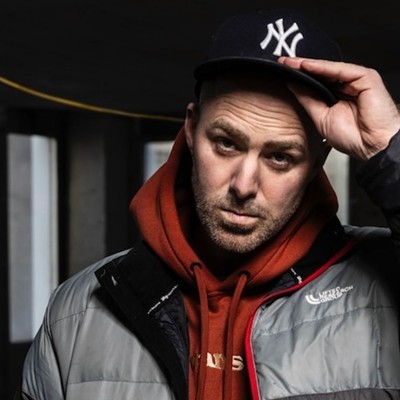It's the same old story: Girl meets boy. Girl is accidentally impregnated. Girl has abortion on Valentine's Day.
In the scrappy, funny Obvious Child, Jenny Slate plays Donna, a New York comedian in her 20s who's just been dumped and ends up pregnant by a one-night stand (Jake Lacy), who's a nice, square guy. It's the directorial debut for Gillian Robespierre, who expanded on her 2009 short (also starring Slate) with writers Anna Bean and Karen Maine.
Robespierre fires off a master list of influential dialoguists: Mike Nichols, Nicole Holofcener, Cameron Crowe, "Nora Ephron, Nora Ephron, Nora Ephron," she says from her home in New York. "I like talky movies." In Obvious Child, Donna talks a lot, not just because it's her job but because she's got a big decision to make. It's a real, contemporary slice-of-life piece Robespierre crafted specifically for her star.
"I wanted to act, I wanted to start acting," says Slate over the phone from Toronto. "I hadn't done any character work yet. I'd done a couple commercials and I'd done plays in school, but that was it. Donna in the initial script didn't have a job, she wasn't a comedian, we didn't know a lot about her. She was a Brooklyn girl and I was very comfortable playing that role."
Robespierre unleashes an enthusiastic stream of praise for Slate, a multimedia talent best known as a comedian (see sidebar), essentially unprompted. "I just love her. I love her humour and I love her face and I love how committed she was to making this movie and telling it in a way that we were all on the same page with," she says. "It was really intimate and a great experience, and she's an amazing human whose ideas for Donna came from a really empathetic and hilarious place and we all wanted to show a deeply human story."
In the ensuing positive press wave, Obvious Child has gotten slotted as "the abortion rom-com," which Slate is not a fan of. "I get it, but I don't like it. Because I feel that it says our movie is making light of abortion or is being rough with the subject, or is being glib or flippant and those are the opposite motivations of what our film's about," she says. "It's a really thoughtful movie. The language of the film is vernacular, there is some scatological humour, there's swearing---but that's the way these characters speak. And the effort is actually a very mature one and very thoughtful and the film is very sensitive. There's nothing about it that's trying to shock in any way."
Robespierre similarly bristles at early reports she wrote the movie in response to sunnier films like Juno and Knocked Up, where abortion is a theme but everything works out fine. (Andrea Dorfman was way ahead of this trend with 2000's Parsley Days.)
"I think there's a place for so many movies. I think there's a million outcomes to unplanned pregnancy and that literally millions of women will have faced unplanned pregnancy and the discussion is nice to have," she says. "Those movies are great and I think they didn't avoid anything, they just told their story from their perspective. And Obvious Child is one woman's story told from a different perspective. Because she chooses to have an abortion, her access is easy and it's safe, she does it without a lot of shame or judgment towards her. We just felt that, you know, the honest portrayals of abortion can be told many ways, but what's really sad and bigger is the lack of depiction of a woman's life, and her sexuality and her health. That's why we wanted Donna to be somebody who decides to have an abortion and show it in a complete way by her being thoughtful and making this serious decision to end her pregnancy but also still having her full and fun life."
Slate, whose layered, lived-in performance has been praised steadily since the film debuted at January's Sundance Film Festival---The Dissolve called her "Obvious Child's beating heart;" "Jenny Slate is a star," raved the Boston Globe; "I really admire her combination of bawdiness and true gentleness," says Robespierre---surprisingly found Donna's confessional stand-up bits the most difficult to play.
"It was really awkward because I'm trying to stand-up in the style that I do it, but you know it's seven in the morning and I'm not really doing my material but I'm putting some of my material in to make sure that all the rhythms are authentic and, you know, the improv aspect of it I really liked," she says. "But in general it's a lot of pressure trying to make extras laugh. Because they're not there to see a comedy show, they're there to sit."
Her favourite scenes to shoot were the dramatic ones---new territory---like when she steps out of her skirt to climb into bed with her mother for comfort, and when she makes the abortion appointment at Planned Parenthood. "Gillian's so brilliant," says Slate. "When the doctor comes in and says 'Hi Dawn,' and Donna has to say 'It's Donn-ah'---I read that and at once it's so funny and such a tiny moment, you would maybe cut it out. But it's so important, and it's those nuances that lend themselves to a tone that is natural and personal, and I haven't done work that is that pared-down and that small yet, but feels really big."
For a first-time director like Robespierre, who's on week two of writing a new feature, the success of an independent like Obvious Child is even sweeter than usual, considering its subject matter and that it was written, produced and directed by women.
"We're just trying to push forward and tell stories in an authentic way, and there's a wave of that happening right now in film and TV, which is nice. There's a tone in our mainstream media that I think is a really exciting tone right now, from Louis CK to Girls to Broad City and Amy Schumer," she says. "And even Tammy, which I haven't seen yet, but Melissa McCarthy is obviously amazing and I think Tammy is in a way an indie film: she and her husband wrote and directed it together, and it's a story that has been silenced. Showing a character like her is not often seen in Hollywood mainstream media. So I'm just excited for the future of storytelling. The more stories that are told in different ways that seek authenticity in their characters, with a range of experiences, it's great."
Queen of All Media
Where you can see, hear
and read Jenny Slate right now.
Parks and Recreation
Slate is Mona-Lisa Saperstein, twin sister to Jean-Ralphio, ex of Tom and a horrible, shallow, useless person. To quote her brother, "She's the wooooORRRRRSSSSST!"
Marcel The Shell with Shoes On
This web phenomenon (over 22 million views!) was created by Slate and her husband, Dean Fleischer-Camp. The short became a New York Times bestselling children's book, Marcel the Shell with Shoes On: Things About Me, with a sequel, The Most Surprised I've Ever Been, due in October.
Catherine This very weird, creepily earnest 12-part web series, another creation with Fleischer-Camp, stars Slate as an office worker. The pair turned it into a 13-minute short film of the same name, which screened at the same Sundance as Obvious Child.
Bob's Burgers
Slate voices Tina's nemesis, cool-girl-with-side-pony Tammy.
Married
This FX comedy, premiering July 17, stars Judy Greer which is all you need to know. Slate plays the young wife of Paul Reiser.
@jennyslate
Slate's hilarious twitter details her moods from hungry to horny, pics and Vines from the Obvious Child tour and, most recently, a family vacation. —TT

